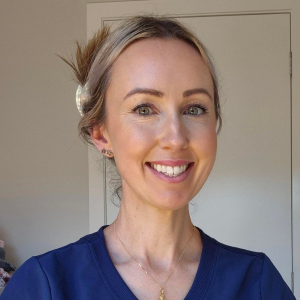Building Graduate Careers in Aged Care

Ausmed Insurance™
Protect your career, stress-free
$10m Professional Indemnity Insurance
1,250+ CPD resources
Heavily discounted for graduates
Welcome to a Career That Matters
A warm welcome to all graduate registered nurses stepping into the dynamic and rewarding field of nursing. You are entering this profession at a pivotal time for the Aged Care sector in Australia, one marked by sweeping reforms, growing recognition, and increasing opportunity.

Who wrote this Guide?
Jessie Bange, University Academic sessional educator and CNS, holds a Graduate Diploma in both Medical-Surgical Nursing and Education, alongside a Bachelor of Nursing (Honors). She has worked across various medical fields, including Emergency, Orthopedics, Neurology, and Oncology. Currently serving on an acute care ward, Jessie is advancing her education with a master's degree in medical-surgical nursing. Since presenting her original research on graduate nursing education at the ANMF conference, Jessie has committed to enhancing patient care, supporting colleagues, and guiding novice nurses with her growing expertise.
A Sector Undergoing Major Change
The current transformation in the provision of aged care results from widespread recommendations from the Aged Care Quality and Safety Royal Commission. As a result, we are seeing significant policy shifts aimed at improving care for older adults, most notably, the implementation of 24/7 registered nurse coverage and increased mandated care minutes for residents.
These changes reflect a powerful recognition: registered nurses play a vital role in upholding the dignity, wellbeing, and safety of our ageing population.
More Than Just a Job
For newly graduated RNs, this represents more than just a career path. It’s a moment of alignment between personal growth and professional impact. Aged care offers many employment opportunities that allow you to advocate for and influence the quality of care provided to some of our most vulnerable community members.
This isn’t just work. It’s work that matters.
Of course, stepping into this space can feel both exciting and daunting. The complexity of the aged care landscape demands more than basic nursing skills; it calls for a deep understanding of regulatory frameworks, critical thinking, clinical judgement, and the ability to manage chronic conditions and cognitive decline with skill and compassion. But you are not alone in this.
Extraordinary investments are being made into the healthcare workforce, offering graduate nurses access to placements, scholarships, preceptorships, and structured professional development programs. These supports exist to help you survive and thrive in your new role.
A Special Specialty
Developing gerontological knowledge, the study of ageing and the associated health challenges, can provide a strong foundation for long-term success. Aged care nursing allows you to build trust and rapport with residents, families, and colleagues. It’s a setting where person-centred care is encouraged and integral. There’s a quiet magic in becoming part of someone’s later life story, advocating for dignity at every stage, and witnessing how thoughtful, continuous care can transform daily experience.
And here’s something important to consider: even if you don’t intend to remain in aged care long-term, your time in this field will never be wasted. It may give you a professional edge. During a recent clinical shift, I overheard one of our graduate nurses speaking with a student nurse, which sparked a lightbulb moment. We often talk about gerontological nursing as a specialty in its own right, and rightly so, but its relevance reaches far beyond that.
Aged Care = Acute Care Advantage
The majority of hospital inpatients today are over 65.
Whether your long-term goal is to work in emergency, intensive care, perioperative services or community health, aged care experience is increasingly considered a valuable foundation. Having expertise in gerontological nursing, or even a postgraduate qualification in the area, not only supports the aged care sector in addressing its current workforce needs, but it also offers new graduates a way to build clinical confidence, develop autonomous decision-making skills, and gain exposure to high levels of patient complexity early in their careers.
Transferable Skills to Fast-Track Your Career
These are the kinds of capabilities transferrable to any nursing role, especially in acute or subacute settings.
Many nurses are discovering that time spent in aged care can be a fast track to securing graduate year placements, transition-to-practice programs, and even leadership positions, sometimes faster than in more traditional acute care pathways. Aged care settings foster resilience, nurture leadership, and require advanced communication and relational skills. These are the very capabilities that healthcare systems nationwide are crying out for.
Reframing the Value of Aged Care
So perhaps it’s time we reframed how we think about careers in aged care. Rather than viewing it as an alternative or second-tier option, let’s recognise it as a strategic, skill-building, and fulfilling entry point into the nursing profession. Whether you choose to remain in this sector or use it as a launch pad, you’ll emerge better prepared, more confident, and deeply grounded in caring for others with compassion and respect.
What a time to begin your career. Your fresh perspectives, curiosity, and compassion are needed now more than ever. By choosing aged care, whether for a season or a lifetime, you’re choosing to lead, grow, and make a difference.
References and Useful Resources
- Australian Nursing and Midwifery Federation. (2021). Staffing and standards in home and residential aged care: ANMF position statement. https://www.anmf.org.au/media/or0doezc/anmf-position-statement-staffing-and-standards-in-home-and-residential-aged-care.pdf
- Australian Nursing and Midwifery Federation. (2023). Aged care work value outcome for nurses working in aged care. https://www.anmf.org.au/media-campaigns/news/aged-care-work-value-outcome-for-nurses-working-in-aged-care
- Manchha, A. V., Walker, N., Way, K. A., Dawson, D., Tann, K., & Thai, M. (2021). Deeply discrediting: A systematic review examining the conceptualizations and consequences of the stigma of working in aged care. The Gerontologist, 61(4), e129-e146. https://doi.org/10.1093/geront/gnaa166
- Piper, D., Carr, S. E., & Jacob, E. R. (2024). Preparing Graduate Registered Nurses for Independence in Aged Care. International Journal of Older People Nursing, 19(6), e12660. https://doi.org/10.1111/opn.12660
- Victorian Department of Health. (2022). Victoria’s healthcare workforce strategy 2022–2032. https://www.health.vic.gov.au/victorian-health-workforce-strategy/victorias-healthcare-workforce
Keep reading

Work Readiness

Boundaries
